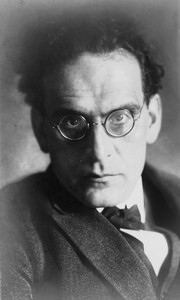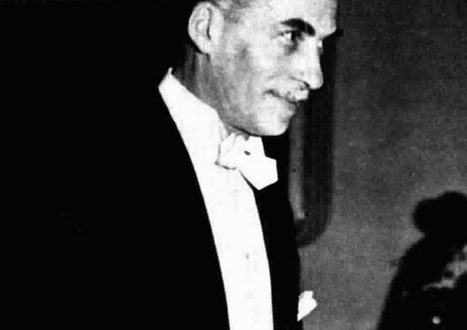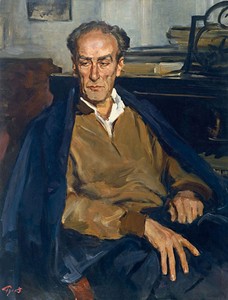
Otto Klemperer |
Otto Klemperer

Otto Klemperer, one of the greatest masters of conducting art, is well known in our country. He first performed in the Soviet Union in the mid-twenties.
“When they understood, or rather, instinctively sensed what Klemperer was, they began to go to him in such a way that the huge Philharmonic hall could no longer accommodate everyone who wanted to listen, and most importantly, to watch the famous conductor. Not to see Klemperer is to deprive yourself of a large dose of impression. From the moment he enters the stage, Klemperer dominates the attention of the audience. She follows his gesture with intense attention. The man standing behind the empty console (the score is in his head) gradually grows and fills the entire hall. Everything merges into one act of creation, in which everyone present seems to take part. Klemperer absorbs the volitional charges of individual individuals in order to discharge the accumulated psychological energy in a powerful, captivating and exciting creative impulse that knows no barriers… In this unstoppable involvement in his art of all listeners, losing the line between themselves and the conductor and rising to the creative awareness of the greatest musical compositions, lies the secret of that colossal success that Klemperer quite deservedly enjoys in our country.
This is how one of the Leningrad critics wrote off his impressions of the first meetings with the artist. These well-aimed words can be continued by the statement of another reviewer who wrote in the same years: “Optimism, extraordinary joy pervades Klemperer’s art. His performance, complete and masterful, has always been living creative music, devoid of any scholasticism and dogma. With extraordinary courage, Klemperer struck with a literally pedantic and strict attitude to the exact reproduction of the musical text, instructions and remarks of the author. How often his interpretation, far from the usual, caused protest and disagreement. I. Klemperer always won.”
Such was and remains to this day the art of Klemperer. This is what made him close and understandable to listeners all over the world, it is for this that the conductor was especially warmly loved in our country. “Klemperer Major” (accurate definition of the famous critic M. Sokolsky), the mighty dynamism of his art have always been in tune with the pulse of people striving for the future, people who are helped by great art to build a new life.
Thanks to this focus of talent, Klemperer became an unsurpassed interpreter of Beethoven’s work. Everyone who has heard with what passion and inspiration he recreates the monumental buildings of Beethoven’s symphonies understands why it always seems to listeners that Klemperer’s talent was created just to embody Beethoven’s humanistic concepts. And it was not for nothing that one of the English critics titled his review of the conductor’s next concert as follows: “Ludwig van Klemperer”.
Of course, Beethoven is not Klemperer’s only pinnacle. The spontaneous force of temperament and strong-willed aspiration conquers his interpretation of Mahler’s symphonies, in which he also always emphasizes the desire for light, the ideas of goodness and the brotherhood of people. In the vast repertoire of Klemperer, many pages of the classics come to life in a new way, into which he knows how to breathe some special freshness. The greatness of Bach and Handel, the romantic excitement of Schubert and Schumann, the philosophical depths of Brahms and Tchaikovsky, the brilliance of Debussy and Stravinsky – all this finds in him a unique and perfect interpreter.
And if we remember that Klemperer conducts with no less enthusiasm in the opera house, giving magnificent examples of the performance of operas by Mozart, Beethoven, Wagner, Bizet, then the scale and boundless creative horizons of the artist will become clear.
The entire life and creative path of the conductor is an example of selfless, selfless service to art. Born in Breslau, the son of a merchant, he received his first music lessons from his mother, an amateur pianist. After graduating from high school, the young man was also going to become a pianist, at the same time he studied the theory of composition. “All this time,” recalls Klemperer, “I had no idea that I might have the ability to conduct. I got on the path of a conductor thanks to the chance when in 1906 I met Max Reinhardt, who offered me to conduct performances of Offenbach’s Orpheus in Hell, which he had just staged. Having accepted this offer, I immediately won such a great success that it attracted the attention of Gustav Mahler. This was the turning point in my life. Mahler advised me to devote myself entirely to conducting, and in 1907 he recommended me for the post of chief conductor of the German Opera House in Prague.
Heading then opera houses in Hamburg, Strasbourg, Cologne, Berlin, touring many countries, Klemperer was recognized as one of the best conductors in the world already in the twenties. His name became a banner around which both the best contemporary musicians and adherents of the great traditions of classical art gathered.
At the Kroll Theater in Berlin, Klemperer staged not only classics, but also many new works – Hindemith’s Cardillac and News of the Day, Stravinsky’s Oedipus Rex, Prokofiev’s The Love for Three Oranges and others.
The coming to power of the Nazis forced Klemperer to leave Germany and wander for many years. In Switzerland, Austria, USA, Canada, South America – everywhere his concerts and performances were held in triumph. Shortly after the end of the war, he returned to Europe. Initially, Klemperer worked at the Budapest State Opera, where he performed a number of brilliant productions of operas by Beethoven, Wagner, Mozart, then lived in Switzerland for a long time, and in recent years London has become his residence. Here he performs with concerts, records on records, from here he makes his and still quite numerous concert trips.
Klemperer is a man of unbending will and courage. Several times a serious illness tore him off the stage. In 1939, he underwent surgery for a brain tumor and was almost paralyzed, but contrary to the assumptions of the doctors, he stood at the console. Later, as a result of a fall and a fracture of the spine, the artist again had to spend many months in the hospital, but again overcame the illness. A few years later, while in the clinic, Klemperer accidentally fell asleep while lying in bed. The cigar that fell out of his hands set fire to the blanket, and the conductor received severe burns. And once again, willpower and love for art helped him return to life, to creativity.
The years have changed the appearance of Klemperer. Once upon a time, he mesmerized the audience and the orchestra with just his appearance. His majestic figure towered over the hall, although the conductor did not use a stand. Today, Klemperer conducts while seated. But time has no power over talent and skill. “You can conduct with one hand. Most of the time, you can only tell by looking. And as for the chair – so, my God, because in the opera all the conductors sit while conducting! It’s just not so common in a concert hall – that’s all,” says Klemperer calmly.
And as always, he wins. For, listening to the playing of the orchestra under his direction, you stop noticing the chair, and the sore hands, and the wrinkled face. Only music remains, and it is still perfect and inspiring.
L. Grigoriev, J. Platek, 1969





